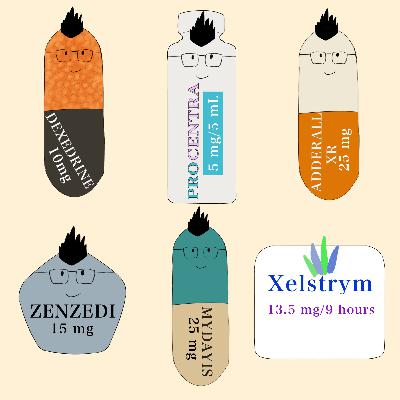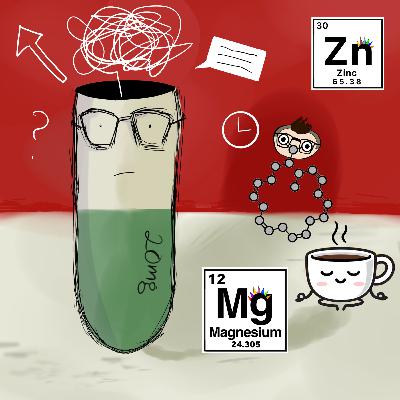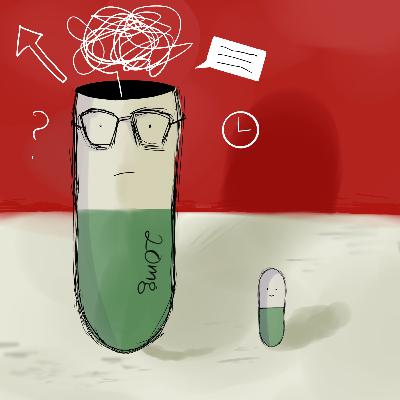Discover This Is Your Brain On Drugs Psychiatry Podcast
This Is Your Brain On Drugs Psychiatry Podcast

This Is Your Brain On Drugs Psychiatry Podcast
Author: Cody Armstrong, MD
Subscribed: 18Played: 367Subscribe
Share
Description
Join Cody Armstrong as he takes you on an adventure through psychiatric medications and beyond, breaking down these oft misunderstood drugs into easy, concise, and digestible pearls with his patented punk rock flare and a healthy dose of real science. Come explore these drugs like never before in fascinating detail whether you are a student, nurse, doc, patient, or just want to learn more. Listen to episodes on the podcast platform of your choice, follow along on YouTube with ease with slides and audio, or download slides at no cost at www.punkrockpsychiatrist.com. This Is Your Brain on Drugs Psychiatry Podcast will never charge you, show you an ad, or take sponsorship dollars from anyone because that just wouldn't be punk rock!
83 Episodes
Reverse
Well, I've finally made it to the end of my nutrition talks and to round that discussion out, I will be going over the scientific data and evidence for improving your mood through improving your diet. There's actually a fair amount of studies out there, and they are growing. We will go over all that evidence today, so if you've been wondering why I've been talking about nutrition on a psychiatric medication podcast, then this episode will answer that question because diet works better than medications, and I'm going to talk about that evidence today.
Today I will be rounding off my information on macro and micronutrients and diet advice, so it's a bit of a hodgepodge. I'll cover cholesterol and protein, and then I'll talk about healthy foods for your brain. These are foods I've been talking about during this whole nutrition section, but I think this gives a good summary of the foods that we have some research on to suggest it is good for mental health.
Today I will be talking about another macronutrient, fats or fatty acids. I did an overview of fats in our omega-3 fatty acid episode, but I didn't really go into detail about the other fats, and there is a lot of controversy surrounding the fats, most particularly saturated fats and seed oils which contain the dreaded omega-6 fatty acids. A lot of people hate saturated fats but are ok with omega-6 and vice versa, so what's the real story? I'm not sure if we fully understand the full truth and I think tensions are too high on either side of this debate. I will do my best to explain what these are and present my evidence for why I don't particularly have a problem with either one of them.
Today I will be continuing with ultra-processed foods and the sugar, fructose. What is it? Where does it come from? What does it do in the body? And why is it a problem? I mean this stuff comes from fruit and fruit is good, right? So, how have we messed this stuff up in modern society? After fructose, I will be talking all about artificial sweeteners. What are the most common types? What are their commercial names? Are they bad for us? If so, how bad and why? I think you'll learn a thing or two today, so please have a listen.
I've been waiting a long time to do this episode. It seems like ultra-processed foods are being talked about a lot this day, but what exactly are they, and what's bad about them? Which ones should we avoid and which ones should we not worry about so much? You may think you know the answer to these questions, but my guess is that there's a lot you don't know, and that's because there's a lot that isn't known, so please have a listen. I think you may rethink a lot of the foods you may have been considering healthy or not. I'm hoping there are some surprises in here for you that makes you reconsider some of your beliefs.
Today I will be covering a very controversial topic, the ketogenic diet. I thought it appropriate to discuss it now while I was going over nutritional aspects of mental health. So, first I'll talk about carbohydrates; what they are, what they do, do we need them. Then, I'll talk about what the ketogenic diet is, how to do it, and what conditions there is some evidence that it may be useful for. At the end I'll talk about how to do it safely if you want to try it on your patients; what conditions are contraindicated with the ketogenic diet and what labs you will need to monitor for safety. I'll give you my unbiased opinion on the subject, but I'm sure people will disagree with me on both sides; some will think I'm too harsh on the diet, and some will say that I'm too much in favor of it, but I walk the gray line as best I can as with everything. I see the good and I see the bad, and this is my perspective.
Today I will be continuing with the lifestyle medicine series, and I will be continuing to talk about nutrition. I will discuss the general way of eating that I advocate for most people, which is a plant-based diet. This doesn't mean no meat products. It means a diet of at least 90% plants. And I acknowledge that it isn't for everyone, but on the whole this is the diet that will lead to a healthier body and mind. I will discuss the principles of this diet, and I will give examples of the types of foods that are in it. I'll talk about fermented foods, fats, omega-3s, proteins, fiber, nutrients, and healthy snacks. I'll give you an idea of the kinds of foods that I think you should eat more of. There's no need for supplements for most people; just whole healthy foods. And we aren't done with this episode. I will be discussing more healthy foods in future episodes, the ketogenic diet, and also the unhealthy foods and what good replacements for them would be. I hope this inspires you that eating healthy can be affordable, fun, easy, delicious, and improve both body and mind. Remember food really is medicine, and if you eat better, you may not need to take any! Have a listen!
This is the episode that I've been waiting a year to do. I'll be talking about Lifestyle Medicine as a treatment for obesity, mental health, and overall health and chronic illnesses. These are techniques that will benefit everyone and are fairly easy and cheap to do. They are also fairly simple. A lot of folks want to make this stuff more complicated that it is so that they can make money off of you selling their programs and supplements, but here at This is Your Brain on Drugs, we don't play that game. We give you free information to make this important information available to everyone. Today I'll start with the introduction. I'll talk about Integrative Psychiatry, Lifestyle Psychiatry, Nutritional Psychiatry, and let you know the nuances between these overlapping concepts. Then I'll get into the nutrition piece of Lifestyle Medicine, and we will have several follow on nutrition episodes from here. If you think you know everything about what to eat and what's good for your body and mind, I think you will definitely find more information in this series. I've made this as science-based as it possible with this subject, so please have a listen!
Today I will be presenting my second episode on obesity medicine. I will go over how obesity reeks havoc on every system in the body, what medical conditions are increased by being obese, the increased risk of psychiatric disorders from obesity, and the long list of cancers that are at increased risk from obesity. I think you all will be surprised just how much obesity impacts health. Many of you may not be aware of how linked obesity is with psychiatric illness. Also I think you will be surprised just how many types of cancer are affected and how strongly. After that I will talk about how to do a thorough assessment, basically the history and physical, for a patient with obesity. We need to rule out other causes, assess motivation for treatment, and assess common comorbidities. This is great foundational information that I think you will find super helpful!
Today I will start a new season of This Is Your Brain On Drugs Psychiatry Podcast. I mentioned the dual season of ADHD with Obesity Medicine and Lifestyle Psychiatry on the previous episode. Last week I started with ADHD and today I will start the series on Obesity Medicine. I'll do an introduction where I talk about measuring obesity, rates of obesity, trends over time, and etiologies of obesity. I think you will find the discussion on etiology to be especially interesting. I decided to include my lectures on lifestyle and nutritional psychiatry into this series as well as these treatments can treat obesity but also are very useful in treating depression, anxiety, and other psychiatric conditions. So, there will be a lot on those topics before I start talking about the medications to treat obesity. I'm really excited to do this season. It's the one that I've been waiting to do for a year, so I hope you enjoy!
Today I will continue talking about all the methylphenidate formulation medications. This will be part 2 of 3 of the truckload of methylphenidate medications. I'll discuss the patch Daytrana, the long-acting liquid Quillavant XR, the long-acting chewable Quillachew XR, the extra long-acting Aptensio XR, the oral disintegrating tablet Cotempla ODT-XR, and the much delayed release Jornay PM. You may be wondering how are these different from each other and when should I choose one over the other. What are the advantages and disadvantages to each? Well, you've come to the right place. Have a listen!
Today I will start talking about the methylphenidate products. I'll start with the oldest ones, brand names Ritalin, Methylin, Metadate, and Concerta. This includes capsules, tablets, liquids, and the special osmotic capsules used by Concerta. I will mention short acting and long acting versions of Ritalin. I'll compare all these and let you know when I think it might be best to use each one. This will be the first of three episodes covering methylphenidate, as there are quite of few of these to go over. They are basically all the same drug, but the formulations are very different, and they all of their place for when they are best used.
Today I will finish the amphetamine medications that we talked about on the last episode. I will be discussing lisdexamfetamine or Vyvanse(r) and the amphetamine base medications, Evekeo(r), Evekeo ODT(r), Dyanavel XR(r), Adzenys XR-ODT(r), and Adzyenys ER(r). You may be less familiar with those other than Vyvanse, so I will go over my usual stuff where I tell you how each of these differs and is unique from other medications, if at all, and let you know what situations that I would consider using each one. Enjoy!
Today I will start discussing the stimulant medications used for ADHD. I will be starting with the amphetamine medications. First, I'll talk briefly about methamphetamine, which is actually a prescribable option, but then I will cover all of the dextroamphetamine and mixed amphetamine salt medications. These include medications you have heard of such as Dexedrine, Procentra, Zenzedi, Xelstrym, Adderall, and Mydayis. I'll go through all the details on what distinguishes each of these medications to help you decide when you might want to use each of them. I mostly stick with only a few of the stimulants, but I will describe some situations where you may want to consider each one of these. This is what I love best. There are so many medications that are so similar, so I think it is important to know the differences between them so that we pick the right med for the right patient.
On today's episode from my ADHD season I will be introducing the stimulant medications. I'll do an overview of all of the stimulants that we will be discussing on the following several episodes. I'll discuss what symptoms you can expect to respond well versus not so well, the different durations of actions, the history behind these medications, and the mechanism by which they work, specifically the difference between amphetamine and methylphenidate as these are our two stimulant classes. I hope you enjoy this introduction to these medications and feel prepared to finally get into talking about the individual medications over the next several episodes in our ADHD series!
On today's episode from my ADHD season I will be talking about the aspects to consider when deciding which medication to choose. I'll talk about why you might consider amphetamines versus methylphenidate. Next, I'll discuss aspects to consider when getting a patient to the correct dose of the medication. Also, these medications have a wide range of how long they work for, so there's a lot to consider when deciding which one to pick. Finally, there a whole host of other things to consider: ability to swallow pills, adverse effects, coexisting disorders, what time of day its most important for the medication to work, cost and availability, and more! This episode will introduce you to all of the aspects you need to consider when selecting the right medication for the patient in front of you. Next, we will begin discussing the medications, and I will be talking about all of the concepts in today's episode as I discuss each med, so I think this will be a really helpful overview for you. Enjoy!
On today's episode from my ADHD season I will be discussing non-pharmacological treatments of ADHD, so basically everything that isn't medication. I'll start off going through the treatment algorithm from stage 0 to stage 5. Today's episode will be stage 0, the first line treatment. It's better to not use a medication if we don't have to, so let's learn what those options are. I'll talk about lifestyle modifications with some details on diet where I'll talk about artificial colors and preservatives as well as melatonin, magnesium, zinc, omega-3 fatty acids, as well as a well-rounded whole foods diet. I'll also talk about some supplements that have been looked at but there really isn't any evidence for. I'll also talk about caffeine. We will go over some coaching strategies of behavioral and social changes to help manage ADHD symptoms. Lastly, I'll talk about eTNS (external trigeminal nerve stimulator) and some digital therapies like Endeavor. I think you will learn a lot and if medication is not an option or not preferred, then these are the things that we have evidence for, so please have a listen!
Today we switch back to ADHD and I will be talking about adult ADHD. I'm an adult psychiatrist and I practiced in the military so this was one of the largest issues that I treated as many of my patients were younger folks, many of which struggled in school prior to joining the military. There isn't a lot of formal education on this topic and yet we see tons of online information of folks talking about how they have adult ADHD and that if you answer these few questions this way then you have adult ADHD, so there's a lot of misinformation out there on this topic. It's a topic that wasn't really discussed at all until the last few decades and many still deny its existence at all. I'm going to talk about it in depth on this episode and I think you will find it very interesting and hopefully different than what you may have heard before. We will dive much deeper than the DSM definition which is mostly designed for children, and I will talk about how someone's life with adult ADHD looks so that you can pick up on the subtleties and make the best diagnosis in order to treat patients with the best care possible. So please have a listen!
Flipping back to ADHD today, I continue with the background information. I'll go over how to diagnose. I'll go over the criteria but of course I'll be giving you the subtleties of how to flush that out. I'll also talk about both mental health and medical disorders that often go along with ADHD, and I'll talk about the long list of other diagnoses that may look like ADHD with a special focus on bipolar disorder.
Today I start a new season of This Is Your Brain On Drugs Psychiatry Podcast. I will do a dual season where I will go back and forth each week between a season on ADHD and a season on Obesity Medicine and Lifestyle Psychiatry. Today I will start with ADHD. I will do a background on ADHD and discuss its possible causes. I think you will enjoy this introduction and discussion on the background of ADHD. I'll do the usual where I discuss what the science says and give my opinions and clinical insights. Have a listen!

























the rhodiola is written with typo